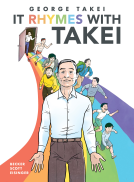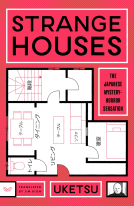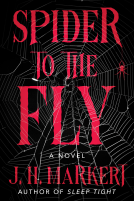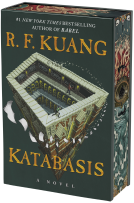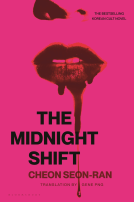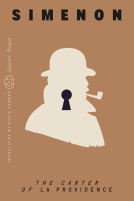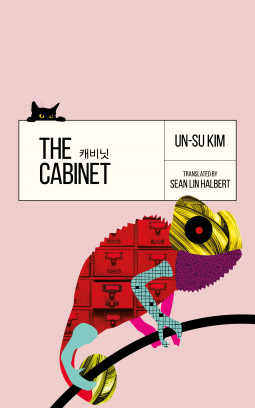
The Cabinet
by Un-su Kim
This title was previously available on NetGalley and is now archived.
Send NetGalley books directly to your Kindle or Kindle app
1
To read on a Kindle or Kindle app, please add kindle@netgalley.com as an approved email address to receive files in your Amazon account. Click here for step-by-step instructions.
2
Also find your Kindle email address within your Amazon account, and enter it here.
Pub Date Oct 12 2021 | Archive Date Oct 07 2021
Talking about this book? Use #TheCabinet #NetGalley. More hashtag tips!
Description
Winner of the Munhakdongne Novel Award, South Korea’s most prestigious literary prize.
Cabinet 13 looks exactly like any normal filing cabinet. Except this cabinet is filled with files on the ‘symptomers’, people whose weird abilities and bizarre experiences might just mark the emergence of a new species.
But to Mr Kong, the harried office worker who spends his days looking after the cabinet, the symptomers are just a headache; from the woman whose doppelganger broke up with her boyfriend, to the man with a ginkgo tree growing from his fingertip. And then there’s that guy who won’t stop calling, asking to be turned into a cat…
A richly funny and fantastical novel about the strangeness at the heart of even the most ordinary lives, from one of South Korea’s most acclaimed novelists.
Translated by Sean Lin Halbert
File Under: Fiction [ 12,000 Cans of Beer | Memory Mosaicers | Will Execution Inc. | Monkey of All Bombs ]
Advance Praise
"[A] brilliant mosaic novel...These stories straddle the lines between science fiction, fantasy, fairy tale, and acute reality."
- Publishers Weekly, Starred Review
"[A] brilliant mosaic novel...These stories straddle the lines between science fiction, fantasy, fairy tale, and acute reality."
- Publishers Weekly, Starred Review
Marketing Plan
- Widespread review coverage in major print and online outlets, in both the mainstream and SF/F press, highlighting The Cabinet as the debut novel by one of South Korea's most acclaimed 21st century novelists.
- Author interviews in online media and bookblogs
- Radio and podcast interview appearances
- Blog tours with sci fi-focused and generalist bookblogs and bookstagrammers
- Online launch event/s
If you're a reviewer, bookblogger or bookstagrammer interested in reviewing or otherwise highlighting The Cabinet, please contact publicist Caroline Lambe at caroline@angryrobotbooks.com
Available Editions
| EDITION | Other Format |
| ISBN | 9780857669179 |
| PRICE | $17.99 (USD) |
| PAGES | 400 |
Links
Featured Reviews
 Paul F, Reviewer
Paul F, Reviewer
"Cold noodles in a bowl for beef broth are not cold noodles. It’s just really poorly made beef broth.
곰탕 뚝배기에 냉면을 담아오면 그것은 냉면이 아니다. 그것은 잘못 만들어진 곰탕일 뿐이다"
The Cabinet is a transation by Sean Lin Halbert of 캐비닛 (the Hangeul phonetic rendition of 'cabinet') by 김언수 (Un-su Kim).
I have previously read 김언수's fascinating thriller The Plotters in Sora Kim-Russell's translation - my review.
This is I believe the debut translation by Sean Lin Halbert, who in 2018 was a Fiction Commendation Award winner in the Korea Times' 49th translation awards.
Cabinet begins with a wonderful disclaimer: All the information contained in the novel has been manufactured, modified, or distorted in some way, and should not be used as evidence in any argument, be it in a respected academic journal or a heated bar fight.
The relevance of this immediately becomes apparent in the opening story about Ludger Sylbaris who, in real-life, was one of the few survivors of the 1902 eruption of Mount Pelée which otherwise killed almost all the population of St Pierre in Martinique, Sylbaris surviving as he'd been incarcerated overnight inan underground cell. But in Kim's retelling, Sylbaris's prison was a tower not a dungeon and he "was locked away in the prison tower for twenty-four long years. He was put in prison at the age of sixteen, and it wasn’t until he turned forty that he was able to leave its confines. In fact, he was only able to escape with the help of the volcano, and not because he had served out his sentence."
The main strand of the novel consists of a number of similar, but entirely fictitious vignettes, drawn from the files of Cabinet 13, an otherwise unassuming filing cabinet in a municipal records office.
It is called Cabinet 13. But there is no particular reason for the number 13. It only means it’s the thirteenth cabinet from the left. This would probably be a better introduction if it had a fancier name. But then again, what would you expect from a cabinet?
A professor at the office has been researching for over 40 years people he dubs as "symptomers", people who have evolved in mysterious ways past our human norms. And our narrator, Kong Deok-geun, stumbles across the archive and ends up working as a filing assistant for Professor Kwon, who explains to him:
"Modern evolutionists like Niles Eldredge and Stephen Jay Gould have argued that species can evolve suddenly after million years of evolutionary dormancy– a theory they called “punctuated equilibrium.”
...
People are showing the symptoms of an evolving species. Without a suitable term from academia, we have decided to call these individuals “people with symptoms” or just “symptomers.” Symptomers break slightly from Homo sapiens as defined by biologists and anthropologists. They exist between the humans of today and the humans of the future– that is, they exist on the branch between species. They are both the last humans and the first of a new kind."
The trigger for such evolution being our hyper-intensive fast-changing capitalist modern world, an example being a group of people who have taken to bear-like hibernation, falling asleep for months on end:
"Modern people cannot fall into a deep sleep. Ever since the invention of electricity and the emergence of monolithic cities, the modern night has fallen into a state of constant unrest. In my opinion, the most lasting legacy of capitalism will be angst. Insurance, stocks, real estate, investments… The entire modern economy is based on anxiety, and as everyone knows, anxiety is the mortal enemy of a good night’s sleep. And insomnia only leads to more anxiety– it’s a vicious cycle. Thus, we are always anxious, internally and externally. Conversely, primitive humans were much more spiritual beings. They worked when the sun was out, and they dreamed and rested once it set. In other words, in order to live properly, you have to follow divine providence and live half your life working, and the other half dreaming."
Another series of stories concerns those whose diet consists of one, seemingly inedible or nutritionless, items - "In Singapore there is a man who lives off newspapers. By now this one should seem quite normal. Compared to ingesting gasoline, glass, and steel, eating newspapers seems almost cute.
...
What should we think of phenomena like these? How can people forgo perfectly fine foods like jjajangmyeon, spaghetti, and stir-fried octopus for gasoline, glass, newspapers, and sawdust? Usually, humans (actually not just humans, all animals) can recognize immediately what they can and can’t eat. It’s what we call the Garcia Effect."
Another is people for whom the border between reality and fiction has dissolved. These people meet their fears, or perhaps the illusion of their fears, in the physical world, including a class who really are eaten by the monsters under their bed.
One particularly poignant story concerns a man with a ginko tree growing from his finger, which he concerns Kong as the tree is taking is literally sucking the life out of the man, although the subject himself is naively delighted:
“Isn’t it splendid! This month it also grew an amazing amount. I guess the manure I applied to it was effective– smelly but effective.
[...]
I have so many questions. How much light should my ginkgo tree be getting? And I heard ginkgo trees are dioecious; do I need to cross-fertilize my ginkgo tree then? If I wave my arm in the air, will it cross-fertilize itself? Or do I need bees or butterflies? Oh, but I hate bees. What then? But it should fine. I can stand butterflies.”
“정말 굉장해요. 이번 달에도 엄청나게 자랐어요. 똥을 썩힌 거름을 바른 게 효과가 있나봐요. 냄새가 좀 나긴 하지만요, 하하.
[...]
물어보고 싶은 게 많아요. 햇빛은 어느 정도 받아야 하는 건지, 은행나무는 암수딴그루라고 하는데 그렇다면 교배는 어떻게 해야 하는 건지, 팔을 벌리고 있으면 알아서 교배를 해주는 건지, 아니라면 벌이나 나비가 해주는 건지. 저는 벌을 싫어하는데 어떻게 하죠? 하지만 괜찮아요. 나비는 좋아하니까요.”
And this story turns out to be the one that gives the novel, otherwise a fascinating collection of odd stories, a narrative spine, as a crime syndicate becomes interested in these hybrid human beings, convinced the Professor created rather than merely catalogued them. The resulting intrigue involves a relationship for Kong with a co-worker suffering from autism spectrum disorders and a torture scene that perhaps needs a trigger warning for the squeamish.
A clever cabinet of curiosities and conspiracies. 4+ stars and recommended.
Thanks to the publisher via Netgalley for the ARC.
Prepare to meet people who drink gasoline, eat steel and chew newspapers, and a man who has a ginkgo tree growing on one of his fingers. They are known as “symptomers”; people who display the symptoms of a new evolution of the human species. Their records are stored in Cabinet 13, looked after by a Mr. Kong and his boss, Professor Kwon. The story introduces us to some of the colourful characters who are documented within the Cabinet and their singular situations. “Torporers” sleep for abnormally long periods, “memory mosaicers” can edit or delete unpleasant memories and “time skippers” lose long periods of their lives in an instant.
And then there are the troublesome, complaining daily phone calls from the symptomers. A persistent non-symptomer, Mr. Hwang, who wants to be turned into a cat to be with the woman he loves, calls everyday. Mr. Kong deals with these bizarre people everyday in a secret area of the lab where he works at a virtually non-existent job. Office politics and interpersonal relationships also play a major part in his daily working life. Eventually, Mr. Kong and the future of the Cabinet and the symptomers are threatened by sinister forces.
There is much to enjoy in the dry humour and bureaucratic silliness of this book but it has a serious side too, with an especially shocking yet darkly funny ending. Korean author Un-su Kim has crafted an absurdly wonderful world of unique individuals and characters. These people are usually greatly troubled, even tortured by their abilities. Beautifully written and translated, funny, tender and sometimes tragic, “The Cabinet” is an offbeat dose of Korean quirkiness and is one of the best books I’ve read all year.
 Dalton S, Reviewer
Dalton S, Reviewer
I found this sci-fi tale of queer abilities and what makes us different and unique to hit me right in the feelings. I laughed, cried, and fell in love with this world of weird abilities and understanding the differences that make us special. Thank you for the e-arc,
The Cabinet was an absolutely fascinating read that captivated me from the very first page. At first it seems to be simply a collection of vignettes -- stories found in Cabinet 13. However, as we reach the second half of the book, one of those tales takes us into a stronger narrative thread, which then plays out until the story's end. The main theme of The Cabinet is a reflection on modern life and the speed of change that takes place these days. The 'symptomers' are people whose bodies have been so affected by this that they develop odd conditions, such as sleeping for months as a time or growing small trees on the tips of their fingers. The metaphors and social commentary are subtly handled, weaving effortlessly amid the stories, making it a book that is both fantastical and thought-provoking at the same time. I would definitely read more from this author in the future. This book gets 5 stars from me.
 Tracy D, Reviewer
Tracy D, Reviewer
I enjoyed this quirky novel which tells the stories of “symptomers” — people who have odd habits or characteristics. Each story ends with a bit of a moral at the end.
Un-su Kim’s novel The Cabinet weaves the real and the unreal together in ways that both reflect and challenge certain assumptions of modern life. Its narrative engages both playfully and touchingly with the humanization of the unusual and the outlandish, the dehumanization suffered by people in capitalist work culture, and the complexity of being human at all in an ever-changing world.
At its finest, The Cabinet’s intricate structure and tragicomic commentary on 21st-century South Korean office culture manage the neat trick of portraying something universal through their very specificity. The boredom and alienation of people who do not feel that what they do has value is artfully juxtaposed with the desperation of people who want to be anything other than what they are, resulting in a narrative rich with empathy for many types of existential struggles.
Overall, this is a fascinating and rewarding read. I would recommend it for anyone who has ever felt alienated by work, relationships, or society at large, and for people who enjoy their absurdist literature spiked with the occasional genuine shock.
I received a free e-ARC of this book via NetGalley in exchange for an honest review.
When I went into this book I had no idea what to expect but woah was it a surprise.. The plot is hard to explain but essentially, we follow Mr. Kong who mans the so called “Cabinet 13”, a cabinet filled with files about symptomers (people with abilities “normal” people don’t possess), as he tells us the life stories of these people and others who don’t necessarily have abilities but just chose to live life in other ways than the norm. As Mr. Kong tells us the reader these stories we follow his life story and the life experiences he has had in his life. With every chapter being told in almost short stories form with not that much plot that binds the chapters together I can see how this book might not be for everyone, but I loved it. Granted, not every chapter is as strong as the next, which is why it is not getting a 5-star rating, nonetheless it is a very engaging story that makes you think about life and the life choices we make and I would recommend everyone to check it out.
cw: graphic depiction of torture
Thank you to Netgalley and Angry Robot for sending me an advanced copy.
 Media/Journalist 698842
Media/Journalist 698842
The Cabinet is a fascinating read, as layered with curiosities as cabinet 13 itself. It shares a similar philosophical intent and double play in its approach to language, metaphor and narrative leap to a writer such as Italio Calvino and underwritten with deep humanity. Playful, heartfelt and truly thought-provoking. Loved it.
Wow, this was a crazy ride! We follow Mr. Kong, who's unhappy with his job because there's nothing to do, until one day he starts sneaking around and stumbling upon Cabinet 13. Cabinet 13 holds various files on "symptomers"—people with strange abilities and/or curious things happening to them, e.g. like a tree sprouting out of their finger. The story switches between cabinet files, stories about the symptomers meeting Mr. Kong, and Mr. Kong's daily life. While the symptomers' stories were pretty hit-or-miss—either you liked them or you didn't—I found the story around Mr. Kong and how he go into the whole thing utterly compelling and curiosity kept me reading on. BUT somehow, the book felt a bit too long with its 400 pages, and could've benefited from ~50 pages less. Other than this, I enjoyed "The Cabinet", as it was so different from Kim's previous released novel, "The Plotters" (except for the last parts).
 Anat L, Reviewer
Anat L, Reviewer
"The Cabinet" and is basically a collection of stories that are grouped together in a closed filing cabinet. In the background is a frame story about a bored office worker, who breaks into the locked closet and reads the stories while at work to pass the time. It is reminiscent of Calvino's If on a Winter's Night a Traveler, via Borges, with touches of something else that I still have a hard time putting my finger on. The central theme is that humanity is evolving in new directions, and the stories present different symptoms, people sleeping for extremely long periods of time, people editing their memories, or merging with trees. This is a social commentary on the modern existence and office culture, reflecting workers who have to kowtow to an obnoxious boss who makes disparaging remarks against a female worker because of her looks.
The stories of these Sympotomers, or Chimeras, seem at first like fanciful anecdotes. However, as the reader advances in the story it appears that they might be creations or experiments done by the Professor. Things head towards a rather tumultuous ending when a crime syndicate takes an interest in those files and tries to buy them from the narrator.
An original imaginative read that begs for a slow reading, which builds into a rather complex tapestry which leaves the reader with food for thought.
Thank you Netgalley and Angry Robot for the digital ARC. #TheCabinet #NetGalley
Thank you to NetGalley for an ARC of The Cabinet.
This is a quirky, fascinating, almost existential read about Symptomers, a select group of people who exhibit odd and bizarre symptoms and qualities that make them stand out from humanity.
The files are entrusted to a salaryman named Mr. Kong, who stumbled upon the cabinet of files accidentally when he was looking to escape the boredom and drudgery of his day job.
Mr. Kong is almost as interesting as the people detailed in the files; he's skeptical of these individuals with bizarre conditions but discovers they are not much different than the rest of us.
The fears and desires of these Symptomers echo the concerns of everyday people; to be someone else; to fit in, to be loved, to be someone better, to relive happy moments, to relive the past.
The writing is good; blunt and sometimes hilarious. A few passages made me smile, laugh and nod in agreement.
Others made me sad and I empathized with Mr. Kong's views on his life, his work, and what he wanted from it, which he wasn't sure about himself. Do any of us really know ourselves as well as we think we do?
I look forward to reading more from this author in the future.
 Sharon A, Bookseller
Sharon A, Bookseller
A mysterious cabinet in a nondescript office building contains files about symptomers, some say the next evolutionary stage of homo sapien. A man who has a ginkgo tree growing out of his hand, the people who lose time or those that sleep through days and months, or for whom the crocodile under the bed is real.
Towards the end Un-su Kim introduces a sense of menace when the Syndicate begins to take an interest in the files for nefarious reasons.
Fantastical, quirky and unusual, like a collection of short stories and interspersed with the life and musings of Mr Kong, the reluctant custodian of Cabinet 13.
My thanks to NetGalley and Angry Robot for an ARC in exchange for an honest review.
I requested this book because I loved Un-su Kim's novel 'The Plotters' which was a very original, yet relatively straightforward Korean crime novel.
This one is much weirder. It is creative, original, strange and crazy, but at the same time extremely readable. It has a whole cast of bizarre characters called 'symptomers', i.e. humans that have started to evolve in different ways in reaction to the circumstances of our species that have radically changed over the past decades. Some skip time, others eat steel and others yet have gingko trees growing from their fingers. On all of these ‘symptomers’ there is a file in 'the Cabinet' where our main character works.
Perhaps the underlying message is to be open-minded and not dismiss people who are a bit different from the rest. Or perhaps there is no underlying message, I don't really care, because I enjoyed the stories and the good writing as such. However, I did find myself wondering repeatedly what the point was of reading these stories. It would have been nice if the central plot had been more prominent - now only two-thirds in things start to make (some) sense - although the overarching storyline wasn't too convincing (unless somebody can at some point share huis eyeopening perspective - that's the problem of ARCs: there are relatively few people or reviews to consult).
Overall very readable also thanks to what seems to be an excellent translation.
Many thanks to Angry Robot and Netgalley for the ARC.
The Cabinet acts as an anthology of "symptomers" people who experience oddities, weird occurrences or powers. These stories are filed in the cabinet and told to you through the eye of the cabinets keeper, while weaving an overarching moral tie-in. I really enjoyed the tone of this book, The narrator reminded me a lot of Ford Perfect from Hitchhikers Guide to the Galaxy.
Having the narrator tell you the stories made the book feel cohesive and lent its self to the overarching plot of the book that kept you interested as the story moved foreword.
the book is quirky, existential creepy and funny. I think its a fast paced worthwhile read.
Un-su Kim's The Cabinet is a mosaic novel that blends numerous genres and influences such as fantasy, sci-fi, thriller, magic realism, and others, all told in the form of an I-novel.
The story of the main character's relationship with the eponymous cabinet and its contents is interlaced with stories about the unique subjects within it. Some of them grow trees out of their hands, others want to become cats, while third drink petrol. What all of them share in common, apart from the fact that they are considered to be the next step in human evolution, is the fact that they don't seem to fit in Korean society. This leads to me to believe that the book is supposed to be an allegory about contemporary society in Korea and the way it's designed to thwart any sense of individuality and uniqueness. However, it ends up quite short of that, not due to the beautiful translation, mind you, but because of the writing itself.
Nevertheless, The Cabinet is a very interesting and quick read that's at least as eclectic as the awesome cover.
 Reviewer 811157
Reviewer 811157
This book was absolutely fascinating and weird and to be completely honest, I have a hard time detailing my thoughts about it.
The book starts as a series of seemingly unrelated anecdotes about "symptomers," people who have evolved mysteriously beyond what is perceived as "normal" for humans. Eventually we learn that our protagonist is an ordinary officer worker named Kong Deok-geun who one day finds Cabinet 13, an inconspicuous cabinet where files on these "symptomers" are stored and begins reading them. What follows is more vignettes each with some kind of moral at the end mixed with hints of a plot surrounding Mr. Kong's daily life and his interactions with his mentor, Professor Kwon.
This definitely will not be for everyone. The plot is pretty much nonexistent and the main characters aren't especially likable. That being said, I really enjoyed it. A few of the vignettes were a miss for me and the number of them sometimes made me question the purpose of the book, making the novel feel longer than its 400 pages. That being said, the writing was beautiful and the chapters that resonated with me really resonated. I particularly loved all of the commentary on office culture and existence in the modern world.
 Reviewer 224449
Reviewer 224449
This is an interesting work of literary fiction - basically interconnected short stories revolving around the Cabinet, a collection of files on unusual people. I think I preferred the early to mid portion of the book to the ending, but overall, it kept my interest and was very interesting.
 Reviewer 638300
Reviewer 638300
Delightfully magical. I love the idea of 'symptomers'. Un-sun Kim has created a magical world. The final part lost me a little, it's very different to the rest of the book and the ending falls a little flat but overall loved it.
From the first page, The Cabinet is such a refreshing read. The author’s rich imagination makes this a fun book to explore: who knows what eccentricities, what symptomers, you will read about on the next page. Or whether or not the overarching story will lead to a climax. Think of a ginkgo tree growing from a man’s finger or people eating gasoline or glass. One man even ate a piece of the Golden Gate Bridge because it was too beautiful to resist. These are people for whom the line between reality and fiction has dissolved.
Absurdity that hits close to home
Many chapters feel a bit absurd, in a good way, but you get used to it and the fascination lessens. For example, the content of the book of Ludger in the story Why, Ludger Sylbaris, Why? is rather amusing. In this first chapter you don’t yet know enough about the world to interpret the words. He describes the eccentricities of the people in Saint-Pierre. With graphic detail. I wonder why.
The narrator is a cabinet manager who discusses people’s stories after reading the records of extraordinary people from the cabinet of curiosities. He staffs his post to get a paycheck. You can analyze his life and the lives of the symptomers he talks about. But is a Torporer who sleeps long to relax and escape life very eccentric? Many people feel like they don’t belong and the only one they can talk to is the cabinet manager.
One chapter that hits home is I’m Over Here, Too, a story about the order of evacuation of objects and people: when you are deemed less important than a strategic object, you may find a newfound interest in objects. If you were to read this chapter separately, it wouldn’t make a big impression on you. But together with the other chapters, it leads to a sense of isolation and loneliness, of not being valued for who you are.
Diversity and inclusion
There is an overarching story for the cabinet manager. People from one chapter are mentioned in other chapters, sometimes their stories continue later. When you read this book, it feels like you are exploring the unknown and unseen extraordinary elements in this world.
For me, this book is about diversity and inclusion. There is no system in place for the people who are different. Nor are they considered strange or pitied. The narrator’s ordinary life is contrasted with the lives of the “special” people who make more of their lives than he does. He just processes all the wonderful opportunities that exist in the world.
There are many different ways to live and it is difficult to understand them all. The more you think about it, the more realistic it becomes. This is us.
Conclusion
The Cabinet is an interesting book that may feel different on re-reading, when you know how it ends and why certain aspects are introduced to the story. But what is the real story? Fiction and reality will blend together differently for you than they do for me. This book made me think and go back to earlier chapters to find more meaning in them. It is not a plot-driven story, it is meaning-driven.
 Reviewer 832068
Reviewer 832068
"The modern night has fallen into a state of constant unrests. In my opinion, the most lasting legacy of capitalism will be angst".
Trigger warning: violence, eating disorders.
The plot is only one part of the story. We follow Mr Kong', glorified office worker turned-cabinet 13's caretaker, as he takes on the responsibility for a sub-group of citizens who exhibit supernatural qualities. Initially lazy and untrustworthy, his character develops beyond expectation into one of humility and self-awareness as he chooses to protect the citizen's whose identities are protected by the relative security of the cabinet.
Korean literature is a guilty pleasure for it's rich undertones of criticism and questioning around modern society. Kim is highly sceptical of current institutions and sheds light on bleak but thought-provoking considerations. "Being human is like taking a number. You just need to wait your turn quietly. There's nothing else you can do". He reflects his ideas in his characters, from the bored and unfulfilled office workers to the sub-group who he subtly hints may be the by-product of human experimentation. This is never confirmed, further highlighting just how little we really know about our lives.
I loved the crude humour, I loved the humanness and the no-frills, dry wit. Each case study was more bizarre than the last and the entire story has no true end, yet plays on the readers mind with possible conclusions. Kim writes exceptionally well in a way that sucks the reader in and leads you along the footpath right until the very last step, allowing you to draw your own conclusions. Bravo.
Thank you to NetGalley for the ARC.
Readers who liked this book also liked:
Brigitte Knightley
General Fiction (Adult), Romance, Sci Fi & Fantasy
Bob the Drag Queen
General Fiction (Adult), LGBTQIAP+, Multicultural Interest
George Takei; Steven Scott; Justin Eisinger
Biographies & Memoirs, Comics, Graphic Novels, Manga, Entertainment & Pop Culture




